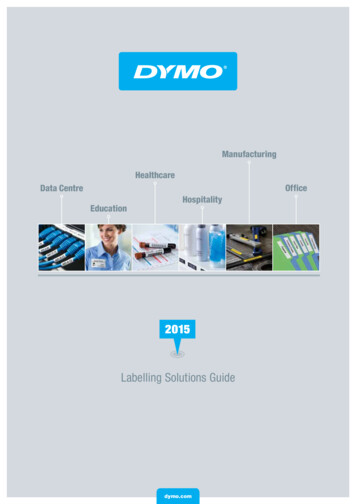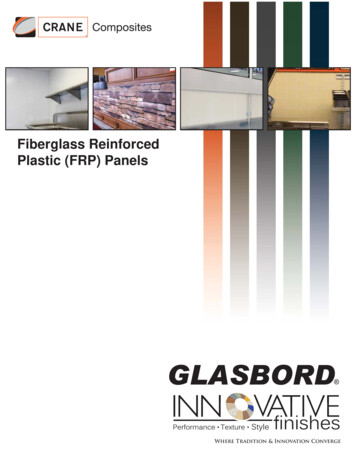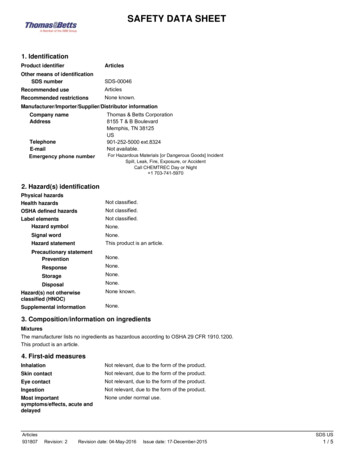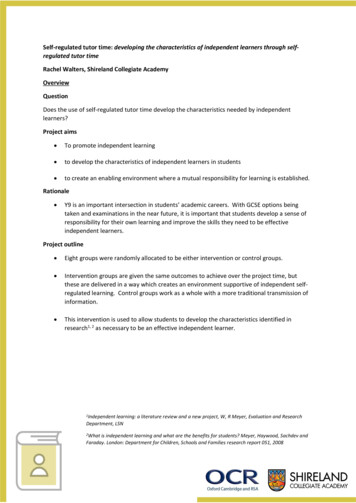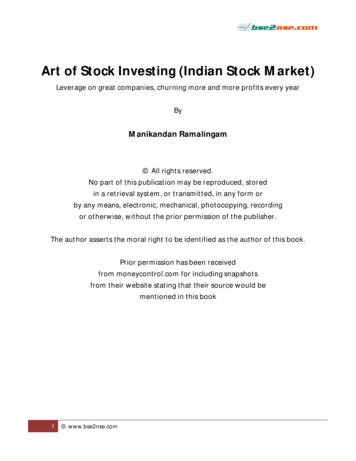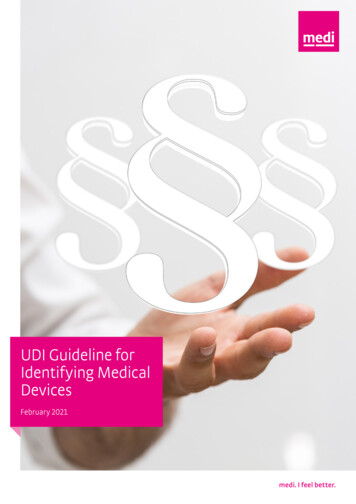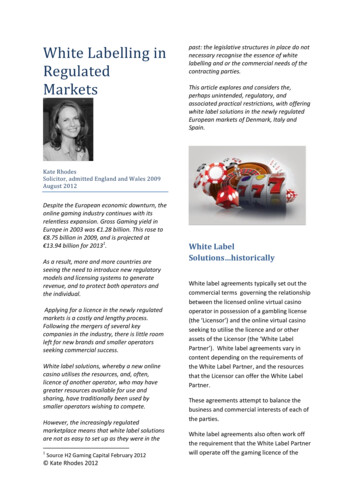
Transcription
White Labelling inRegulatedMarketspast: the legislative structures in place do notnecessary recognise the essence of whitelabelling and or the commercial needs of thecontracting parties.This article explores and considers the,perhaps unintended, regulatory, andassociated practical restrictions, with offeringwhite label solutions in the newly regulatedEuropean markets of Denmark, Italy andSpain.Kate RhodesSolicitor, admitted England and Wales 2009August 2012Despite the European economic downturn, theonline gaming industry continues with itsrelentless expansion. Gross Gaming yield inEurope in 2003 was 1.28 billion. This rose to 8.75 billion in 2009, and is projected at 13.94 billion for 20131.As a result, more and more countries areseeing the need to introduce new regulatorymodels and licensing systems to generaterevenue, and to protect both operators andthe individual.Applying for a licence in the newly regulatedmarkets is a costly and lengthy process.Following the mergers of several keycompanies in the industry, there is little roomleft for new brands and smaller operatorsseeking commercial success.White label solutions, whereby a new onlinecasino utilises the resources, and, often,licence of another operator, who may havegreater resources available for use andsharing, have traditionally been used bysmaller operators wishing to compete.However, the increasingly regulatedmarketplace means that white label solutionsare not as easy to set up as they were in the1Source H2 Gaming Capital February 2012 Kate Rhodes 2012White LabelSolutions historicallyWhite label agreements typically set out thecommercial terms governing the relationshipbetween the licensed online virtual casinooperator in possession of a gambling license(the ‘Licensor’) and the online virtual casinoseeking to utilise the licence and or otherassets of the Licensor (the ‘White LabelPartner’). White label agreements vary incontent depending on the requirements ofthe White Label Partner, and the resourcesthat the Licensor can offer the White LabelPartner.These agreements attempt to balance thebusiness and commercial interests of each ofthe parties.White label agreements also often work offthe requirement that the White Label Partnerwill operate off the gaming licence of the
Licensor. The services they cover may alsoinclude use of the Licensor’s technical oroperational infrastructure, support,transactional processing, maintenance,affiliate programme, risk and fraud screening.White Label Solutions in NewlyRegulated MarketsThe new gaming licencing regimes in Italy,Denmark and Spain vary in the way theyaddress white labelling arrangements, whichhas created substantial confusion anduncertainty for the operators licenced in thesejurisdictions.Typically, a smaller operator may wish toenter these markets in the capacity as a whitelabel operator if it did not have the time orresources to submit a licence application, or itmay want to test the waters and see how wellits brand is received by the general public,before applying for a licence itself, if andwhen the tender process re-opens.Before a White Label Partner and Licensorconsider entering into a white labelagreement in either the Italian, Danish orSpanish markets, they need to recognise thatany arrangement they might enter will notreflect our typical definition andunderstanding of a white label agreement, asdescribed earlier.Italy the challengesIn Italy, the fundamental challenge a WhiteLabel Partner and Licensor must overcome isthat, under the current gaming legislation, theplayer at the virtual casino is only allowed oneregistered account under each licence.Therefore, given that the primary function ofa white label agreement often involves thecasino licence holder granting a licence to theWhite Label Partner to operate off theLicensor’s gambling licence, it is difficult tofind a practical work-around solution thatfacilitates play between a player and the twoonline casinos both operating off the samelicence, when only one account is permittedby law. There is then the issue that both theLicensor and White Label Partner must bewilling for their funds to be combined.The second challenge with implementing awhite label solution in Italy is a commercialconsideration, and also linked to the fact thatonly account is permitted per licence holder.If a player is restricted to one account perlicence holder, upon the signing of a whitelabel agreement, only new players would beviable new customers at the White LabelPartner’s casino. Should the player already beregistered with the Licensor, they will alreadyhave a gaming account and, under law, arenot permitted to register another account. Ifthe White Label Partner and Licensor cannotwork off the same platform, then the WhiteLabel Partner and Licensor must accept thatthey will be in direct competition with eachother for new players.The third issue with offering white labelsolutions in the Italian market is linked to thesecurity and responsible gaming measures inItaly. If a player, registered with either theLicensor or White Label Partner, closes theiraccount, they need to wait 15 days beforeregistering a new account. In the instance Kate Rhodes 2012
where a player, after closing their originalaccount at the Licensor’s casino, wishes toplay at the White Label Partner’s casino, theywould need to wait 15 days before opening anew account at the White Label Partner’scasino, as the White Label Partner’s casinowould hold the same licence number as theLicensor’s casino. Whilst this is effective froma compliance and responsible gaming point ofview, it is commercially unsatisfactory.only undertake the marketing tasks inconnection with the provision of gamblingactivities. The White Label Partner cannot haveany influence over the operation ofthe casino or the gambling accounts. The White Label Partner cannot holdownership of the database ofregistered players on the system.Italy addressing the issuesItaly is quite straightforward with regards tothe white label application itself - there is noformal documentation which needs to besubmitted to the regulator and there are norestrictions as to the use of software provider(which must be approved by AAMS2).However, there are several compliancerequirements which the White Label Partnermust abide by concerning the presentation ofthe website, for instance, the White LabelPartner must make it clear that it operates offthe Licensor’s gaming licence. This means thatsubstantial care must be taken as to the whitelabel design and set-up when implementingthe solution.Whilst theoretically white label agreementsare accepted and can be implemented in Italy,there are still practical and commercial issueswhich inhibit the full business opportunitiesthat historical white labelling can provide.Denmark the challengesThe parameters of the operation for a WhiteLabel Partner in the Danish market are quiterestrictive, since a White Label Partner may2AAMS notification guidelines can be found -gioco-a%20distanza-14-12-2010.pdf Kate Rhodes 2012 The White Label Partner must nothave any relationship with registeredplayers other than in respect ofmarketing in relation to the gaming. The White Label Partner must use thesame software provider and any otherthird party services as the Licensor.Denmark addressing the issuesNotwithstanding the aforementionedrestrictions, White Label Partners are,however, free to decide the layout of theirwebsite, their games, and to decide how thebrand is to be marketed. Any activities thatthe White Label Partner conducts must be inaccordance with the various provisionsdescribe in the relevant Danish GamingAuthority guidance relating to these sectors3.Unlike Italy, the main advantage of offering awhite label solution in Denmark is that aplayer can have a gambling account both withthe White Label Partner and the Licensor. Thismeans the players who have alreadyregistered with the Licensor will also be viablenew customers at the White Label Partner’scasino, and provides great opportunities forcross-marketing (providing the Danish3Reference to White Labelling can be found atsection 5.2 of the Danish Gaming AuthorityGuideline document for Licence Holders
Advertising Regulations are followed). Thereis some degree of flexibility as to which actualgames and providers the White Label Partnercan use – the White Label Partner does notneed to offer all the games that are offered bythe Licensor, and if the Licensor is using twosoftware providers the Danish GamingAuthority are happy to accept that the WhiteLabel Partner only uses one of them.Spain the challengesThere is no explicit prohibition for whitelabelling under the Spanish GamingRegulations, however, the gaming legislationdefines ‘operator’ as a company running agaming activity which requires a licence tolegally operate. Within the parameters of thedefinition there is no direct provision forwhite labelling, however, given the operationof any gaming activity requires a licence, theactivities which White Label providers arerestricted purely to marketing.Accordingly, a player can have only oneaccount which is registered with the Licensor.The White Label Partner cannot registerplayers, nor maintain an agreement or gamingaccount with them. The White Label Partnercan only provide the ‘look and feel’ of theLicensor’s website. The only documentationthat needs to be submitted to the gamingauthorities is the affiliate/white labelagreement in order to demonstrate that theWhite Label Partner is an affiliate, and that itdoes not meet the legal requirements in orderto be considered as an operator – should theWhite Label Partner be considered anoperator, it would be required to obtain alicence4.4Article 3 of the Royal Decree 1614/2011 of 14thNovember, namely article 3.4 expressly excludingobtaining a licence to: “Those companies thatexclusively perform an affiliation activity, Kate Rhodes 2012Spain addressing the issuesSpain is the most restrictive of the newlyregulated markets since the historicaldefinition of white labelling falls within theoperation of casino activity and thereforewould require a separate licence. To offer anytype of casino games in Spain requires alicence. The most appropriate agreement inplace for a White Label Partner to offer theirservices in Spain would be under a marketingagreement.Available optionsFrom a practical standpoint, there arepossibilities for a form of white labelling in theregulated markets of Italy, Denmark andSpain. However, the regulatory frameworks ofthese countries are structured in such a waythat the activity of the White Label Partnerand Licensee is legislatively and practicallyrestricted. Traditionally, and in otherjurisdictions such as Malta, white labelagreements have been allowed to provide agreater breadth of activity.consisting in a promotion activity or by obtainingnew clients for the gaming operator, as far as donot register clients or maintain an agreement orgaming account with them (the clients [the users])do not need to obtain a licence”.
In Italy, white labelling is restricted by the factthat a player may only have one account perlicence, Where a technical solution can’t befound, the White Label Partner and Licensorwill have to reach a business compromise,bearing in mind that they will be in directcompetition with each other.In Italy, white labelling is restricted by the factthat a player may only have one account perlicence. Where a technical solution cannot befound, the White Label Partner and Licensorwill have to reach a business compromise,bearing in mind that they will be in directcompetition with each other.Notwithstanding the challenges, Italy is by farthe most straightforward country whenaddressing white label solutions. In Denmark,the White Label Partner’s activity is restrictedto the marketing of a website and itsassociated games which at least providesgood testing ground for the Danish market inthe eventual instance of a licence application.To ensure compliance, the white labelagreement must be sent for approval by theDanish Gaming Authority.In Spain, the White Label Partner is expresslyexcluded from offering any gaming activityunder the Spanish legislation. The activity ofthe White Label Partner is restricted tomarketing, in which case a well draftedaffiliate agreement should be in place.ConclusionWhite labelling is an innovative and mutuallyrewarding business arrangement. Ideally, theregulated market legislation should have moreexpress provisions concerning white labelling,and a better commercial understanding of thepractical functionalities of white labelrelationships. This would provide moreopportunities to construct a stronger Kate Rhodes 2012commercial model, generating revenue forLicensor, the White Label Partner andregulators alike.It will be interesting to see if any amendmentsin the current legislative regimes, which mayappear in the forthcoming months, addressthese issues and ensure that white labelling iseventually easier to facilitate.
Kate Rhodes 2012
Kate Rhodes 2012
Partner). White label agreements vary in content depending on the requirements of the White Label Partner, and the resources that the Licensor can offer the White Label Partner. These agreements attempt to balance the business and commercial interests of each of the parties. White label agreements also often work off
